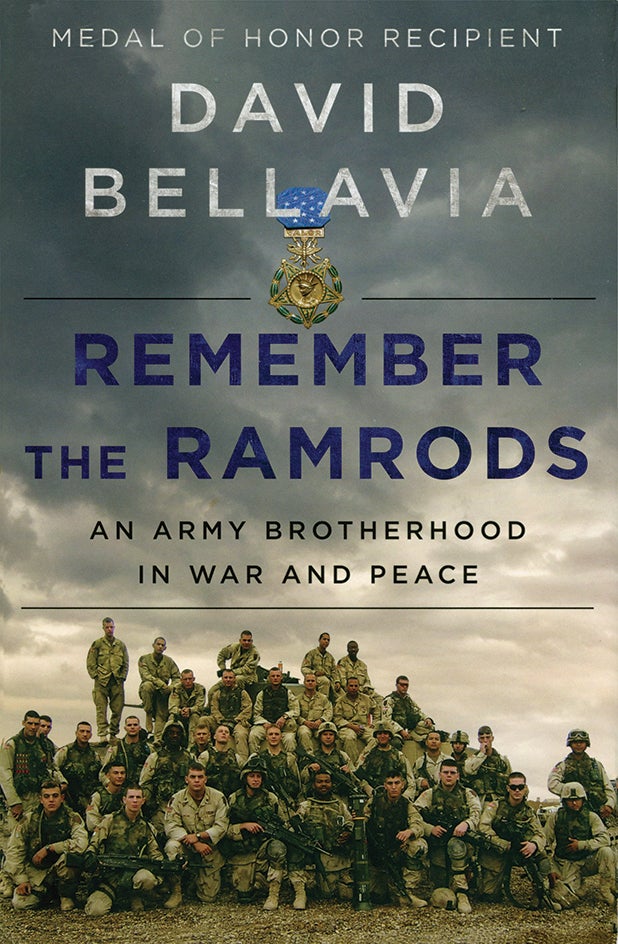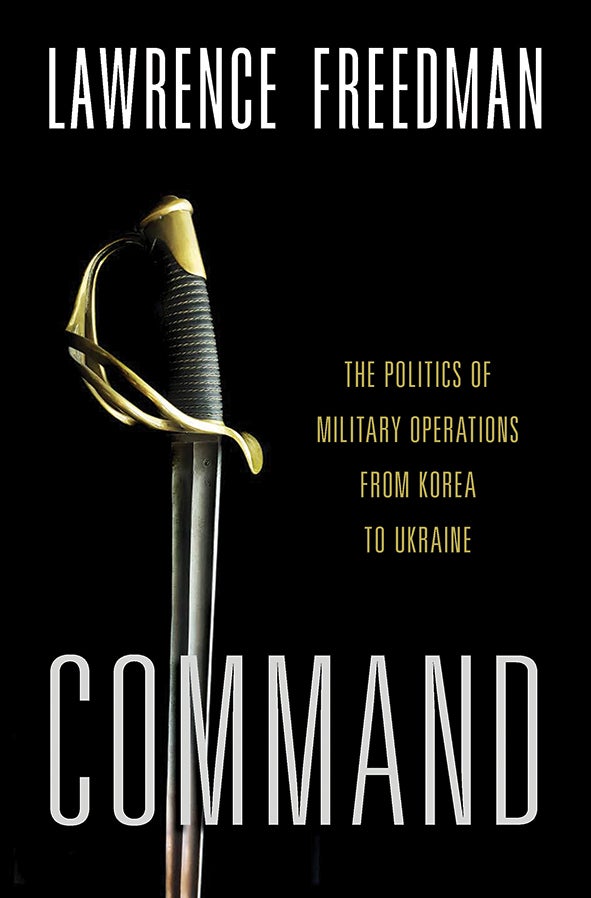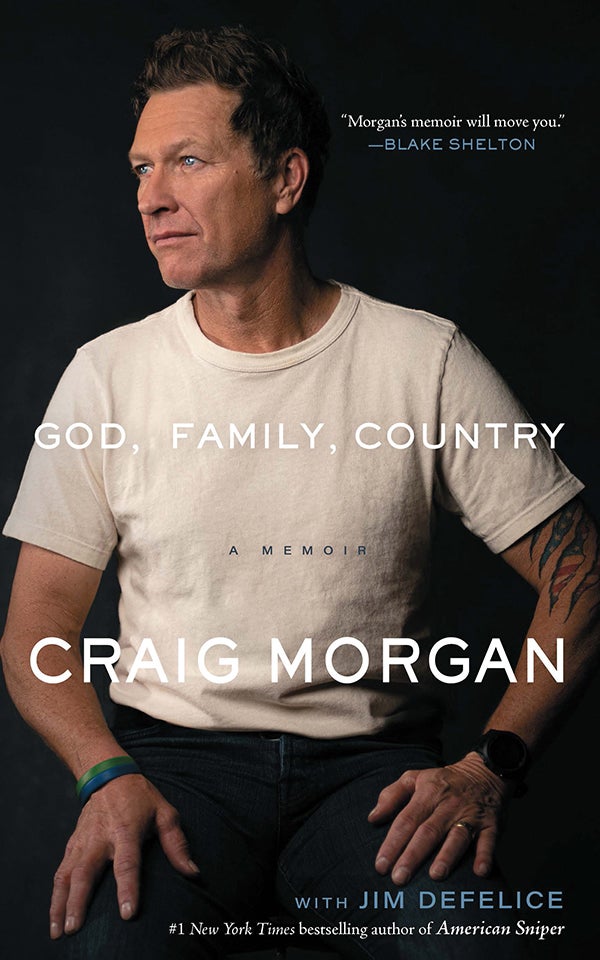March 2023 Book Reviews
March 2023 Book Reviews
Soldiers Find Healing in Medal of Honor

Remember the Ramrods: An Army Brotherhood in War and Peace. David Bellavia. Mariner Books. 384 pages. $29.99
By Edward Lengel
Several Medal of Honor recipients who went above and beyond the call of duty in Iraq and Afghanistan have written powerful memoirs. These include Clinton Romesha and his Red Platoon: A True Story of American Valor; Dakota Meyer (and Bing West) and his Into the Fire: A Firsthand Account of the Most Extraordinary Battle in the Afghan War; and Flo Groberg (and Tom Sileo) and his 8 Seconds of Courage: A Soldier’s Story from Immigrant to the Medal of Honor.
Among the foremost—and first—of these is David Bellavia and his House to House: An Epic Memoir of War, with John Bruning, which was released in 2007. Bellavia has now written a notable follow-up in Remember the Ramrods: An Army Brotherhood in War and Peace.
Born in Buffalo, New York, in 1975, Bellavia enlisted in the U.S. Army in 1999 and served with the 2nd Battalion, 2nd Infantry Regiment—the “Ramrods”—of the 1st Infantry Division. By 2004, when his unit deployed to Fallujah, Iraq, as part of Operation Phantom Fury, Bellavia was a staff sergeant serving as a squad leader.
On Nov. 10, 2004, during house-to-house fighting in Fallujah, Bellavia sprang into action when insurgents pinned down a squad of American soldiers inside a building. He took on the enemy under direct fire and allowed his fellow soldiers to disengage.
Seeing an insurgent about to fire a rocket-propelled grenade, Bellavia on his own initiative proceeded to clear the building, room by room. During close-quarters fighting, he demonstrated immense skill, bravery and dedication to the welfare of his comrades, killing four insurgents and badly wounding a fifth.
Like many others who received the Medal of Honor, Bellavia neither sought nor expected any special distinction for his conduct. Rather, he continued in combat service with the same quiet devotion to duty he had always demonstrated. After leaving the Army in 2005, he returned to action as an embedded war correspondent in 2006 and 2008, writing House to House before returning home to his family and settling in western New York.
His receipt of the Medal of Honor in June 2019 from President Donald Trump came as a surprise that was not entirely welcome, for Bellavia had sought over the years to put the war—and its scars—behind him.
Yet the medal ceremony also served as a healing moment. The surviving members of Bellavia’s battalion had mostly gone their own ways after the war. Like him, they each sought healing and purpose. But, as has been the case for generations of veterans, the way back was hard.
As Bellavia articulates elegantly in Remember the Ramrods, the gulf between those who had served and those who hadn’t yawned like an unbridgeable chasm. Veterans struggled to relate to civilians and civilian life, just as others struggled to relate to them. The consequences of those feelings were often alienation, including broken families and communities.
Bellavia reunited the Ramrods for the White House ceremony—it was the first time the unit had gathered since the war—and together, they were able to recover some sense of meaning and understanding.
Remember the Ramrods begins with a return to the Iraq War and those moments in Fallujah that earned Bellavia the Medal of Honor. It chronicles the actions of the men of Bellavia’s unit through war and peace, following them as they pursued their separate postwar ways, then bringing them back together at the Medal of Honor ceremony in a ritual of reunification and healing.
Like other Medal of Honor recipients, Bellavia does not regard the medal as his personal possession but as something he shares with his comrades as a testament to their shared service and dedication to their country. In this new memoir, he pays tribute to them and sets an example that soldiers and civilians alike may follow.
Edward Lengel is vice president for museum experience at the National Medal of Honor Museum, which is under construction in Arlington, Texas. He has written 14 books on American history, including Never in Finer Company: The Men of the Great War’s Lost Battalion. He holds a doctorate in history from the University of Virginia.
* * *
Behind the Scenes of Decision-Making

Command: The Politics of Military Operations from Korea to Ukraine. Lawrence Freedman. Oxford University Press. 624 pages. $34.95
By Col. Gregory Fontenot, U.S. Army retired
Lawrence Freedman’s latest book, Command: The Politics of Military Operations from Korea to Ukraine, examines the nature and execution of operations in the context of the politics of decision-making. Freedman uses 15 cases to explore the requirements of command. Ranging from Korea to Ukraine, these cases include familiar examples such as the Cuban missile crisis and less well-known cases, including Che Guevara’s adventure in the Congo.
These essays are of particular utility because previous books have tended to focus on the world wars, “when vast armies met in one titanic clash after another,” as Freedman writes.
This is a good book with one shortcoming: Freedman does not clearly articulate what he means by “the politics of military operations.” The introduction is a review of the thinking of other scholars, and his own thinking, but he does not offer a unifying definition or framework.
The complexity of policymaking at the strategic level may explain his reticence. Still, his review provides useful fodder for thinking about the command and control architecture in nation-states or, in the case of Che, among revolutionaries.
None of the cases in the book predates the Korean War, so this is largely a study of more recent operations. Perhaps the most important insight is that there is a divide, not between “the civilian and military spheres, but between those in the national capital and those in the field,” Freedman says.
His examination of the Falkland Islands War, for which he was the official British historian, is arguably his best case for understanding the “interplay between … political and operational considerations,” he writes.
The crisis in the Falklands came to a head when Argentina seized the islands on April 2, 1982. The invasion surprised British Prime Minister Margaret Thatcher’s government. Determined not to let the occupation stand, the U.K. had to project power and sustain an operation 8,000 miles away.
The difficulties the British found in mounting unanticipated operations so far from home should resonate with the experience of U.S. expeditionary operations since Operation Just Cause in 1989, and with current consideration of similar operations in the Indo-Pacific. The problems differ in scale, not scope.
Thatcher’s government determined its policy objective clearly: remove Argentine forces from the islands. Nothing else came easy. The U.K. had no joint command infrastructure established for anything like what followed. Thatcher had little conception of the time-distance problem involved or the readiness of her forces. This is not uncommon with civilian leadership. Reasoned and politically savvy advice from military advisers is vital.
Thatcher had several other problems, including too many “cooks” in the government, which she resolved by reducing the number of direct advisers to form a small war Cabinet. President Ronald Reagan, her closest ally, proved unhelpful, urging some kind of settlement. Thatcher managed it all and grew into an effective wartime executive.
Freedman’s analysis shows the difficulty of managing joint operations muddled by poor communications, inadequate command and control structure and ineffective strategic leadership. He also concludes that the complexity and transparency of contemporary operations have led to unparalleled growth in command structures. Freedman argues that bloated bureaucratic structures are problematic.
He also raises questions about the adequacy of professional military education and the growing potential of artificial intelligence. His foray into the politics of command will not surprise but is well worth critical reading.
Col. Gregory Fontenot, U.S. Army retired, commanded a tank battalion in Operation Desert Storm and an armor brigade in Bosnia. He is a former director of the School of Advanced Military Studies. His next book, No Sacrifice Too Great: The 1st Infantry Division in World War II, is to be published in June.
* * *
Surviving Deployments, the Difficult Aftershocks

Where Cowards Go to Die. Benjamin Sledge. Regnery Publishing. 256 pages. $29.99
By Timothy Heck
New soldiers come with a variety of life experiences that influence how they see themselves, their unit, their mission and their purpose. Some of those experiences are positive, while others have subtle or not-so-subtle corrosive impacts on the soldier.
While the formative experiences of boot camp and MOS school do a good job of establishing a baseline for behavior and inculcating the Army’s cultural norms, a soldier recruited into the Army is not a blank slate. In addition to their duffel bag and personnel folder, they bring with them emotional baggage and past traumas.
Benjamin Sledge, a former civil affairs soldier, shows the impact that pre-Army life has on soldiers as they adapt to combat. Sledge’s first book, Where Cowards Go to Die, follows him from his strict upbringing in the heartland to two combat deployments in the early years of the global war on terrorism.
Sledge enlisted in 1999 as a U.S. Army Reserve civil affairs soldier, in part to escape his upbringing. The events of 9/11 lead to Sledge’s deployment in Afghanistan in 2003. Sledge is open about his fears. Here, his writing is perhaps the most candid. He openly writes about trying to hide those fears from his teammates, with the exception of a seasoned NCO who calls his bluff and takes Sledge under his wing.
The deployment to Afghanistan, at a time when America is focused on Iraq, is a rough one, with several incidents deeply weighing on his psyche. The incidents, including providing first aid to casualties at a small forward operating base while rockets fly by, will be familiar to many veterans. Indeed, his writing is of such immediacy that I could almost hear the “Incoming!” alarms while reading it.
Sledge is perhaps at his best as a writer when talking not about the deployment but about the aftershocks for him and his unit. Obvious signs of post-traumatic stress disorder develop and are ignored or shoved aside by Sledge, who stays in the Reserve and becomes an NCO. Eventually, he finds himself responsible for the new soldiers on his team as they prepare for a deployment to Ramadi, Iraq. It is only after the Iraq deployment that Sledge begins to take stock of his life and starts the healing process.
Where Cowards Go to Die is a quick read, and Sledge’s writing style keeps the narrative moving. The book does not advance the understanding of the role of civil affairs or the nature of America’s wars in Iraq or Afghanistan, nor is it necessarily meant to, but parts of it could be a good primer for leaders as they prepare to meet their soldiers. Those men and women, like Sledge, are not blank canvases, but rather humans shaped by their lives before joining the Army.
Where Cowards Go to Die illuminates the perspective of some of those privates and young NCOs. The book lacks the gravity of classics such as Karl Marlantes’ What It Is Like to Go to War, but it should be considered when trying to understand the junior soldier.
Timothy Heck is deputy editorial director at the Modern War Institute at the U.S. Military Academy, West Point, New York. He also is a Marine Corps Reserve artillery officer serving with the Joint Chiefs of Staff Joint History Office. He is an editor of the book On Contested Shores: The Evolving Role of Amphibious Operations in the History of Warfare and of multiple chapters and articles about the Red Army in World War II.
* * *
Soldier-Turned-Singer Makes a Difference

God, Family, Country: A Memoir. Craig Morgan With Jim DeFelice. Blackstone Publishing. 478 pages. $25.99
By Gen. David Goldfein, U.S. Air Force retired
As a lifelong fan of country music, I was honored when asked to write a review of country music artist Craig Morgan’s book, God, Family, Country. As a young cadet at the Air Force Academy in 1980, I left after two years to pursue a dream of making my way in the world of country music. Fortunately for the music industry, I didn’t cut it and returned to complete the academy experience and serve 37 years in the U.S. Air Force, finishing a career in service as the 21st Air Force chief of staff.
Morgan left the U.S. Army to try his hand at the music game and had the opposite experience. He rose to the top of the music industry and blessed us with songs that touch our hearts and will live forever. We both found our calling.
Morgan’s book reads just like his music: simple, powerful, emotional, heartfelt, fun, tragic and 100% Craig Morgan. Co-author Jim DeFelice does a nice job making sure it is Morgan’s voice coming through on every page and in every story and chapter.
In addition to the backstories for hits like Almost Home and That’s What I Love About Sunday, readers get a view into all aspects of Morgan’s life: serving with the 82nd Airborne Division and the 101st Airborne Division (Air Assault), and deploying during Operation Just Cause; working undercover to combat sex traffickers in Thailand; his life as a professional outdoorsman.
Throughout the book, Morgan’s stories of his wonderful wife captured me most.
Karen Greer has been there through every stage of Morgan’s career. From raising young children (their own and foster children) while Morgan was deployed around the world, to supporting him when he was out developing and testing his music at local clubs (after he completed duties on-post), to caring for the family as a wonderful grandmother.
Especially poignant is how the couple handled the tragic loss of their beloved son Jerry, an experience captured in the heart-wrenching song The Father, My Son, and The Holy Ghost. Military spouses exhibit a special kind of courage when they endure the long hours, the separations and the loneliness that come with this profession.
My wife, Dawn, and I are about to celebrate our 40th anniversary. I have a sign in my closet that reads, “Home of the Free Because of my Wife.” Truer words have never been written.
Thank you, Karen Greer, for giving us Craig Morgan. God, Country, Family is a great read about a great couple who have made a difference for all of us.
Gen. David Goldfein, U.S. Air Force retired, is a senior adviser at Blackstone and chairman of the board of Google Public Sector. In August, he will become chairman of the board of USO. A former combat fighter pilot, he commanded at every level and finished his military career as 21st chief of staff of the Air Force.

